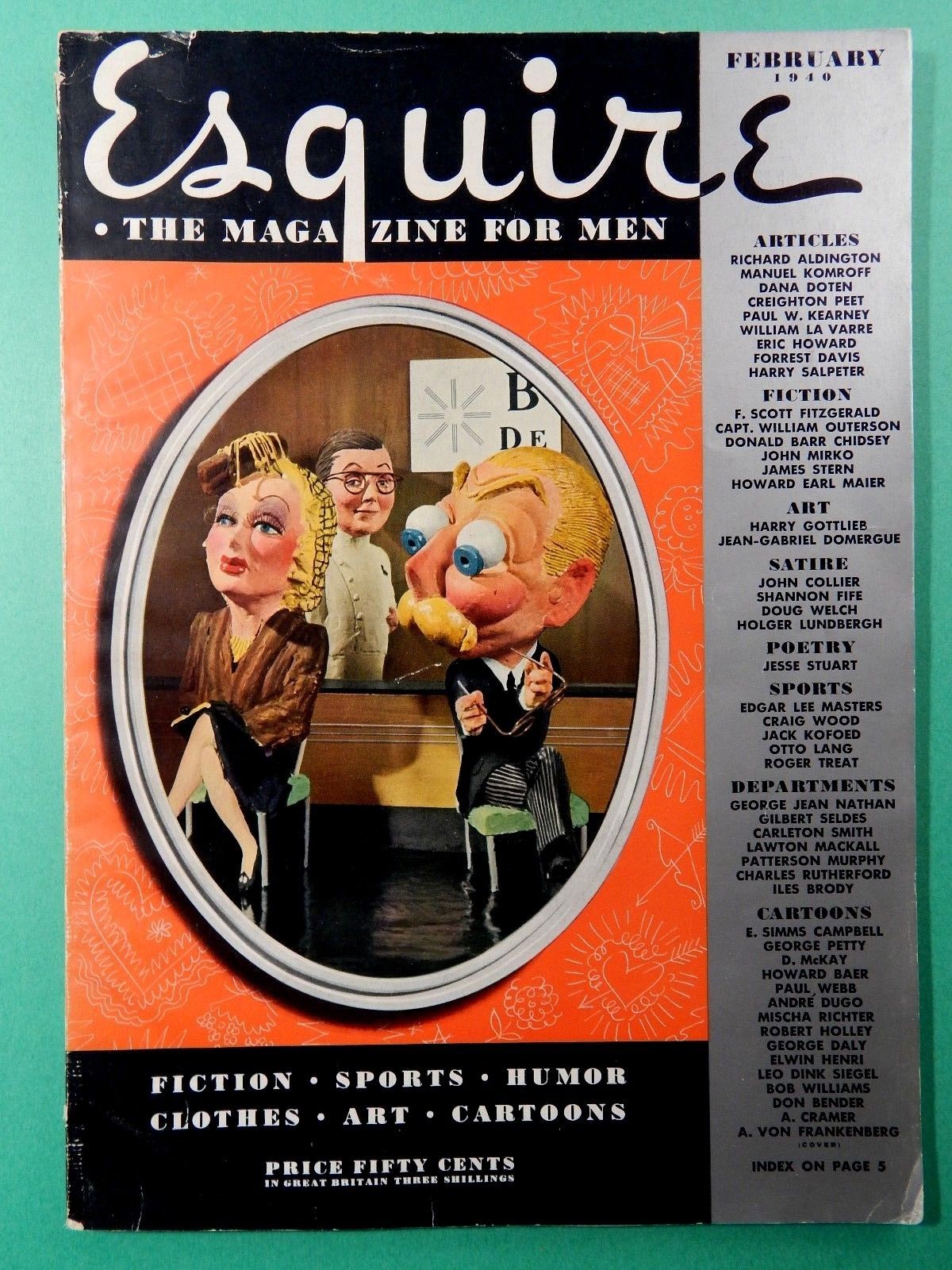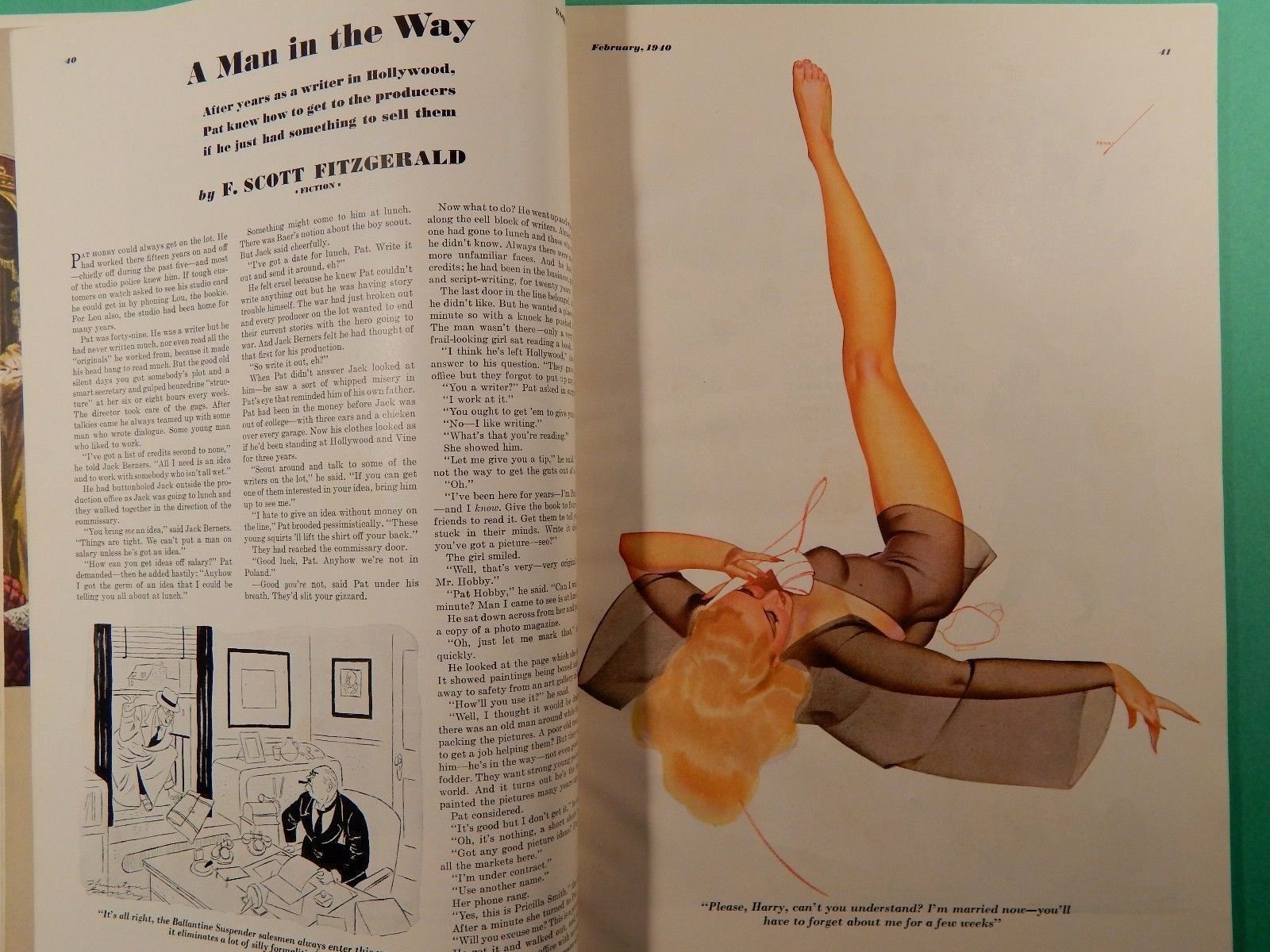
A Man in the Way
by F. Scott Fitzgerald
I
Pat Hobby could always get on the lot. He had worked there fifteen years on and off—chiefly off during the past five—and most of the studio police knew him. If tough customers on watch asked to see his studio card he could get in by phoning Lou, the bookie. For Lou also, the studio had been home for many years.
Pat was forty-nine. He was a writer but he had never written much, nor even read all the “originals” he worked from, because it made his head bang to read much. But the good old silent days you got somebody’s plot and a smart secretary and gulped benzedrine “structure” at her six or eight hours every week. The director took care of the gags. After talkies came he always teamed up with some man who wrote dialogue. Some young man who liked to work.
“I’ve got a list of credits second to none,” he told Jack Berners. “All I need is an idea and to work with somebody who isn’t all wet.”
He had buttonholed Jack outside the production office as Jack was going to lunch and they walked together in the direction of the commissary.
“You bring me an idea,” said Jack Berners. “Things are tight. We can’t put a man on salary unless he’s got an idea.”
“How can you get ideas off salary?” Pat demanded—then he added hastily: “Anyhow I got the germ of an idea that I could be telling you all about at lunch.”
Something might come to him at lunch. There was Baer’s notion about the boy scout. But Jack said cheerfully:
“I’ve got a date for lunch, Pat. Write it out and send it around, eh?”
He felt cruel because he knew Pat couldn’t write anything out but he was having story trouble himself. The war had just broken out and every producer on the lot wanted to end their current stories with the hero going to war. And Jack Berners felt he had thought of that first for his production.
“So write it out, eh?”
When Pat didn’t answer Jack looked at him—he saw a sort of whipped misery in Pat’s eye that reminded him of his own father. Pat had been in the money before Jack was out of college—with three cars and a chicken over every garage. Now his clothes looked as if he’d been standing at Hollywood and Vine for three years.
“Scout around and talk to some of the writers on the lot,” he said. “If you can get one of them interested in your idea, bring him up to see me.”
“I hate to give an idea without money on the line,” Pat brooded pessimistically, “These young squirts’ll lift the shirt off your back.”
They had reached the commissary door.
“Good luck, Pat. Anyhow we’re not in Poland.”
—Good YOU’RE not, said Pat under his breath. They’d slit your gizzard.
Now what to do? He went up and wandered along the cell block of writers. Almost everyone had gone to lunch and those who were in he didn’t know. Always there were more and more unfamiliar faces. And he had thirty credits; he had been in the business, publicity and script-writing, for twenty years.
The last door in the line belonged to a man he didn’t like. But he wanted a place to sit a minute so with a knock he pushed it open. The man wasn’t there—only a very pretty, frail-looking girl sat reading a book.
“I think he’s left Hollywood,” she said in answer to his question. “They gave me his office but they forgot to put up my name.”
“You a writer?” Pat asked in surprise.
“I work at it.”
“You ought to get ’em to give you a test.”
“No—I like writing.”
“What’s that you’re reading.”
She showed him.
“Let me give you a tip,” he said. “That’s not the way to get the guts out of a book.”
“Oh.”
“I’ve been here for years—I’m Pat Hobby—and I KNOW. Give the book to four of your friends to read it. Get them to tell you what stuck in their minds. Write it down and you’ve got a picture—see?”
The girl smiled.
“Well, that’s very—very original advice, Mr Hobby.”
“Pat Hobby,” he said. “Can I wait here a minute? Man I came to see is at lunch.”
He sat down across from her and picked up a copy of a photo magazine.
“Oh, just let me mark that,” she said quickly.
He looked at the page which she checked. It showed paintings being boxed and carted away to safety from an art gallery in Europe.
“How’ll you use it?” he said.
“Well, I thought it would be dramatic if there was an old man around while they were packing the pictures. A poor old man, trying to get a job helping them. But they can’t use him—he’s in the way—not even good cannon fodder. They want strong young people in the world. And it turns out he’s the man who painted the pictures many years ago.”
Pat considered.
“It’s good but I don’t get it,” he said.
“Oh, it’s nothing, a short short maybe.”
“Got any good picture ideas? I’m in with all the markets here.”
“I’m under contract.”
“Use another name.”
Her phone rang.
“Yes, this is Pricilla Smith,” the girl said.
After a minute she turned to Pat.
“Will you excuse me? This is a private call.”
He got it and walked out, and along the corridor. Finding an office with no name on it he went in and fell asleep on the couch.
II
Late that afternoon he returned to Jack Berners’ waiting rooms. He had an idea about a man who meets a girl in an office and he thinks she’s a stenographer but she turns out to be a writer. He engages her as a stenographer, though, and they start for the South Seas. It was a beginning, it was something to tell Jack, he thought—and, picturing Pricilla Smith, he refurbished some old business he hadn’t seen used for years.
He became quite excited about it—felt quite young for a moment and walked up and down the waiting room mentally rehearsing the first sequence. “So here we have a situation like It Happened One Night—only NEW. I see Hedy Lamarr—”
Oh, he knew how to talk to these boys if he could get to them, with something to say.
“Mr Berners still busy?” he asked for the fifth time.
“Oh, yes, Mr Hobby. Mr Bill Costello and Mr Bach are in there.”
He thought quickly. It was half-past five. In the old days he had just busted in sometimes and sold an idea, an idea good for a couple of grand because it was just the moment when they were very tired of what they were doing at present.
He walked innocently out and to another door in the hall. He knew it led through a bathroom right in to Jack Berners’ office. Drawing a quick breath he plunged…
“…So that’s the notion,” he concluded after five minutes. “It’s just a flash—nothing really worked out, but you could give me an office and a girl and I could have something on paper for you in three days.”
Berners, Costello and Bach did not even have to look at each other. Berners spoke for them all as he said firmly and gently:
“That’s no idea, Pat. I can’t put you on salary for that.”
“Why don’t you work it out further by yourself,” suggested Bill Costello. “And then let’s see it. We’re looking for ideas—especially about the war.”
“A man can think better on salary,” said Pat.
There was silence. Costello and Bach had drunk with him, played poker with him, gone to the races with him. They’d honestly be glad to see him placed.
“The war, eh,” he said gloomily. “Everything is war now, no matter how many credits a man has. Do you know what it makes me think of? It makes me think of a well-known painter in the discard. It’s war time and he’s useless—just a man in the way.” He warmed to his conception of himself, “—but all the time they’re carting away his OWN PAINTINGS as the most valuable thing worth saving. And they won’t even let me help. That’s what it reminds me of.”
There was again silence for a moment.
“That isn’t a bad idea,” said Bach thoughtfully. He turned to the others. “You know? In itself?”
Bill Costello nodded
“Not bad at all. And I know where we could spot it. Right at the end of the fourth sequence. We just change old Ames to a painter.”
Presently they talked money.
“I’ll give you two weeks on it,” said Berners to Pat. “At two-fifty.”
“Two-fifty!” objected Pat. “Say there was one time you paid me ten times that!”
“That was ten years ago,” Jack reminded him. “Sorry. Best we can do now.”
“You make me feel like that old painter—”
“Don’t oversell it,” said Jack, rising and smiling. “You’re on the payroll.”
Pat went out with a quick step and confidence in his eyes. Half a grand—that would take the pressure off for a month and you could often stretch two weeks into three—sometimes four. He left the studio proudly through the front entrance, stopping at the liquor store for a half-pint to take back to his room.
By seven o’clock things were even better. Santa Anita tomorrow, if he could get an advance. And tonight—something festive ought to be done tonight. With a sudden rush of pleasure he went down to the phone in the lower hall, called the studio and asked for Miss Pricilla Smith’s number. He hadn’t met anyone so pretty for years…
In her apartment Pricilla Smith spoke rather firmly into the phone.
“I’m awfully sorry,” she said, “but I couldn’t possibly… No—and I’m tied up all the rest of the week.”
As she hung up, Jack Berners spoke from the couch.
“Who was it?”
“Oh, some man who came in the office,” she laughed, “and told me never to read the story I was working on.”
“Shall I believe you?”
“You certainly shall. I’ll even think of his name in a minute. But first I want to tell you about an idea I had this morning. I was looking at a photo in a magazine where they were packing up some works of art in the Tate Gallery in London. And I thought—”
Published in Esquire magazine (February 1940).
Not illustrated.

